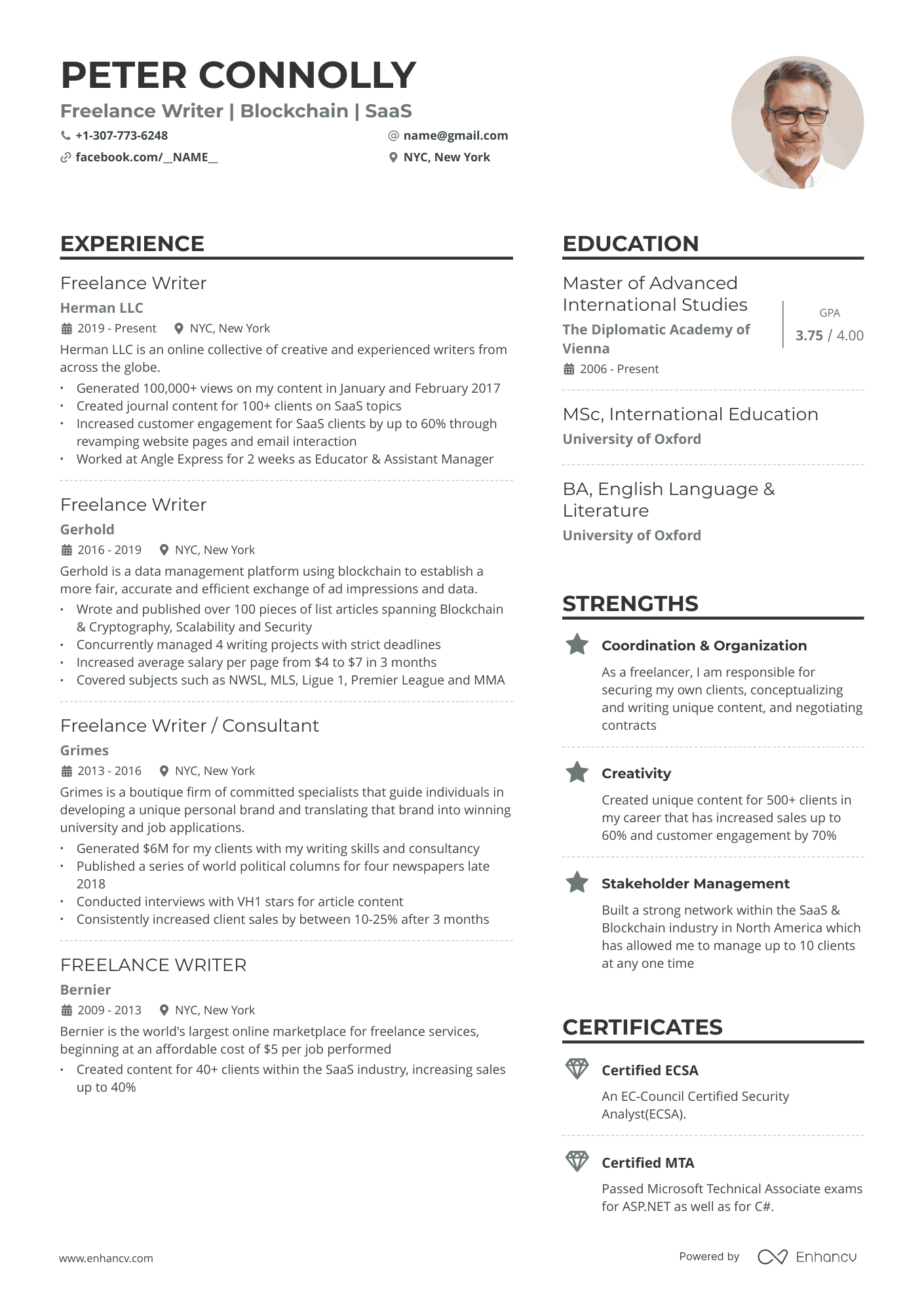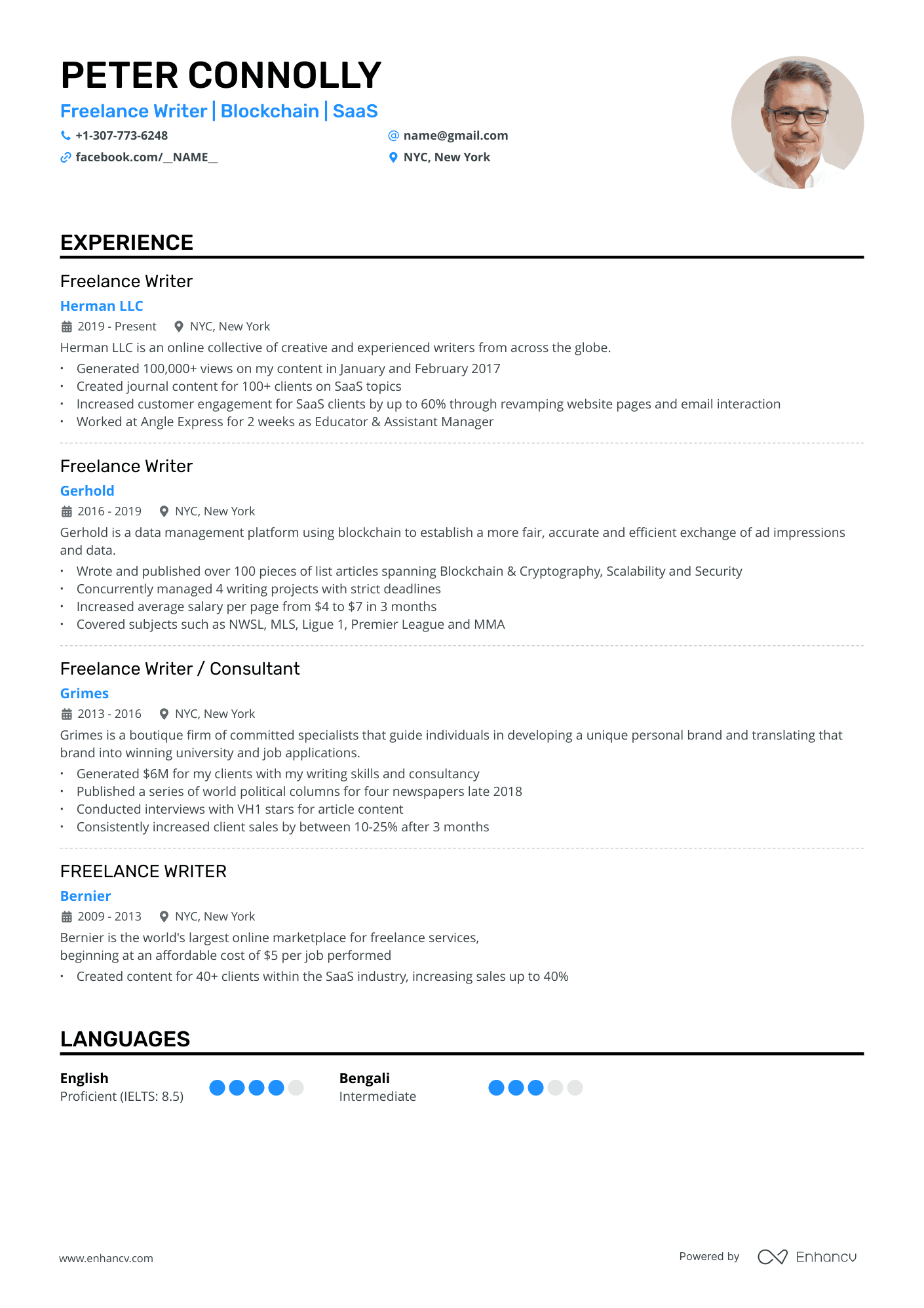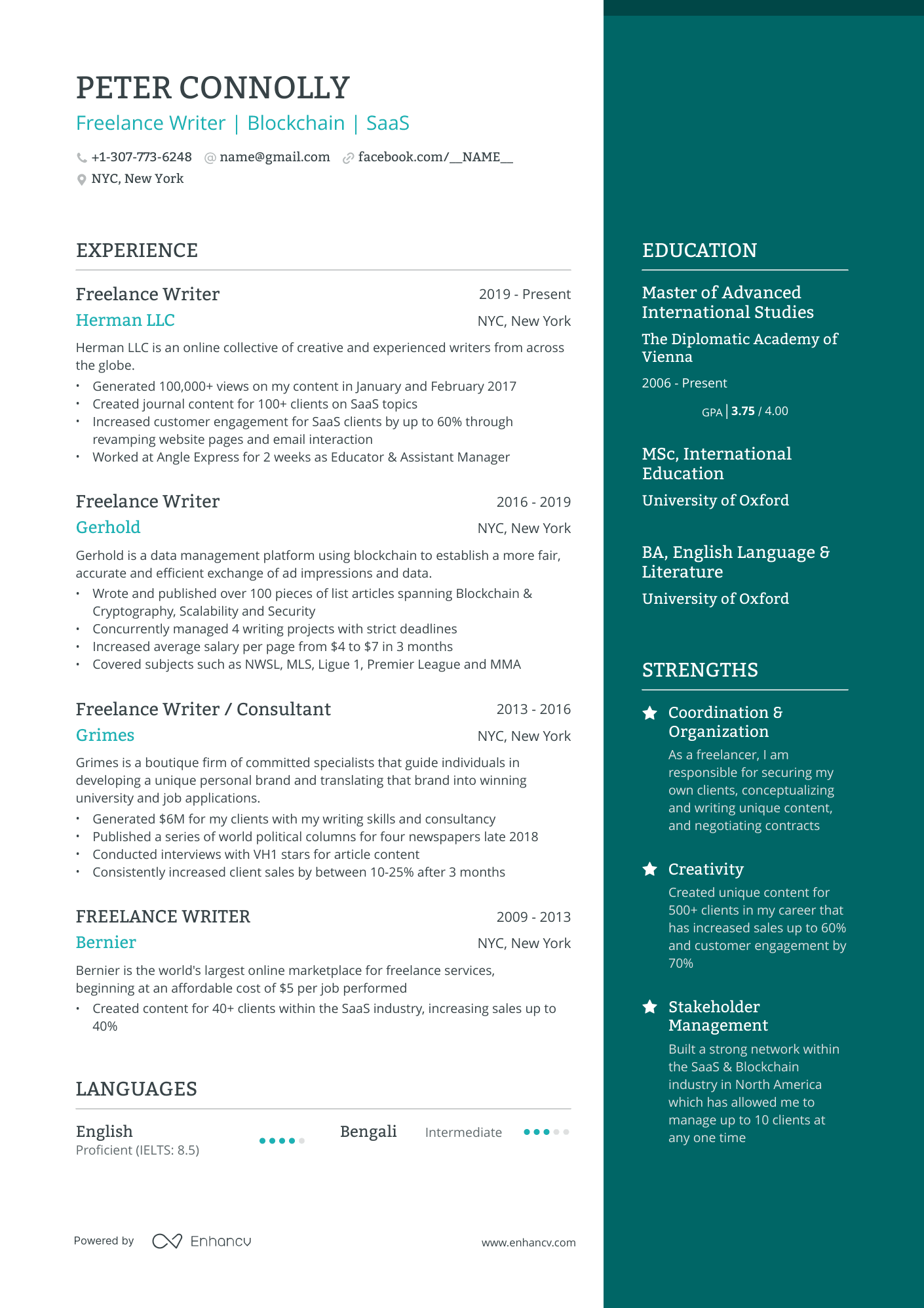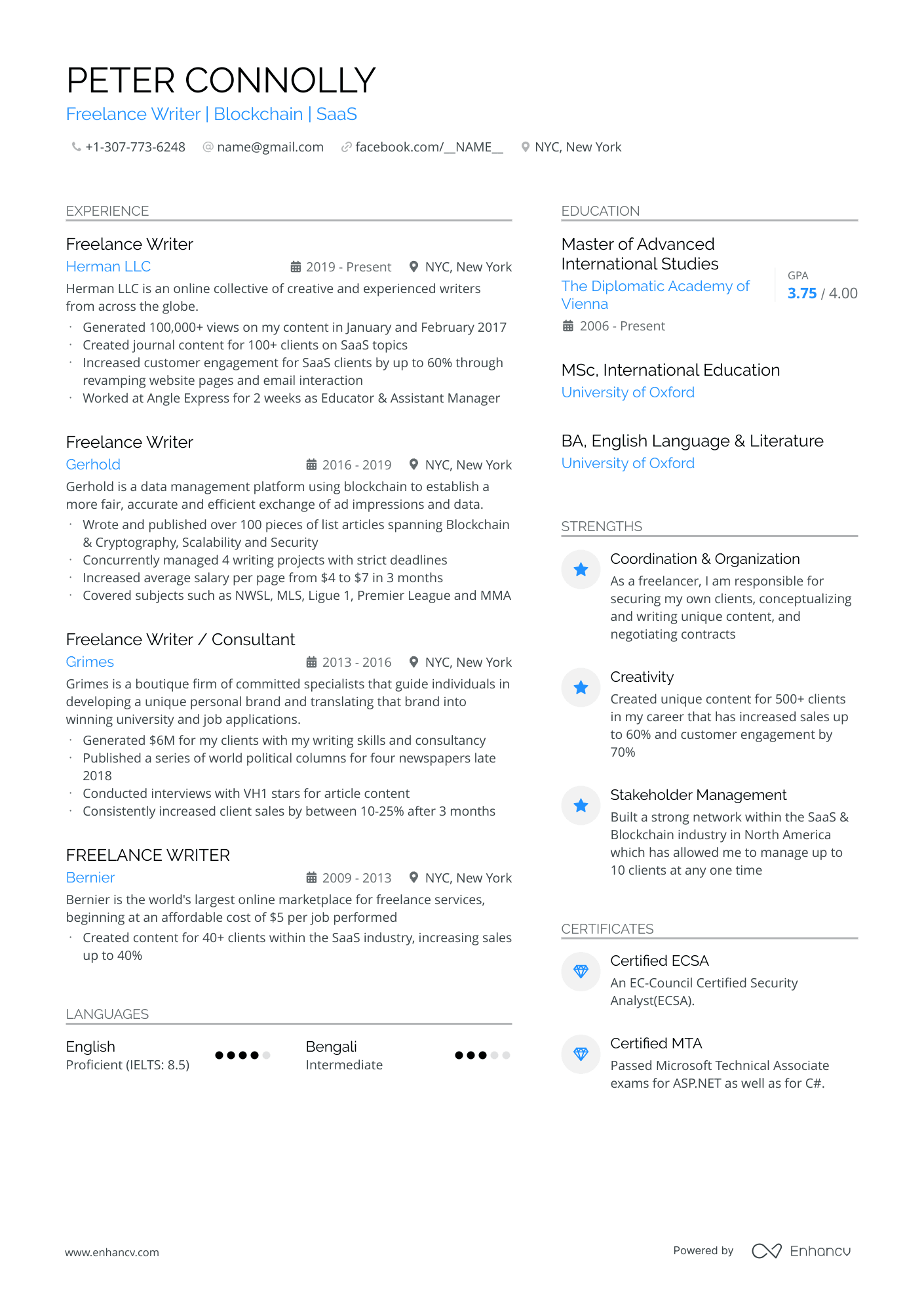If you're reading this, chances are you understand what it takes to earn $5,000 a month as a writer. This level of income typically involves a hefty amount of copywriting, proofreading, and content repurposing—key tasks for a freelance writer. One of the greatest perks of this job is the freedom it offers: you get to choose when, where, and who you work for. The hardest part? Pitching and selling your work to potential clients.
This guide will equip you with all the essential tools to market your skills. Assuming you've already put together a portfolio, your next move is to create a resume. Never overlook the power of a well-crafted resume. In most professional contexts, having both a portfolio and a resume really lets you show off what you can do, like a pitch that sells your story.
So, this is what we’ll be covering in today’s freelance writer resume guide:
- The best way to format your resume so it passes ATS scanning and recruiter scrutiny with flying colors.
- How to tailor your resume experience section to both the job description and the specific market needs.
- How to display the versatility and breadth of your skills across different styles, formats, and subjects.
- Which technologies and certifications might serve you to level up your freelance writer application.
- What to include in your resume summary to not only communicate your achievements but also let employers assess the quality, tone, and fit of your work.
- Which additional resume sections can boost your pitch and land you a job..
For those who need more specific insights, our specialized resume guides for writers are just the resources you need.
- Content Marketing Resumes
- Copywriter Resumes
- Technical Writer Resume
- Writer Resume
- Freelance Copy Editor Resume
- Content Editor Resume
- Editor Resume
- Freelance writer Cover Letter
Let’s dive in.
How to format a freelance writer resume
The structure of your resume not only reflects your organizational skills but also your ability to adapt to different roles. Whether you're applying to a specialized niche or a more generalist position, your resume should clearly demonstrate your clarity, organization, and storytelling abilities.
Let's talk about the three common resume formats. The reverse-chronological resume lists your experiences starting from the most recent and working backwards. Then we have the functional (or skill-based) resume which is great for candidates with limited or no experience. However, for freelance writers, the most suitable resume format is the combination (hybrid) resume. It blends the chronological with the functional layout, giving equal justice to both your work history and your skills.
Here are the advantages of using a hybrid resume:
- Showcases diverse skills: Freelance content writers typically have a diverse set of writing skills, from technical writing to creative storytelling. The combination resume allows you to highlight these varied skills right at the top in a dedicated skills section. This immediately showcases your breadth of expertise.
- Highlights specific achievements: This format allows you to connect specific skills with concrete achievements. For instance, under each job or project, you can detail accomplishments like, say, increased blog engagement. This method directly links your skills to measurable outcomes.
- Flexibility in presenting experience: Excellent for freelancers who manage multiple projects, allowing you to group similar work under categories like "Freelance projects" or by client, detailing specific roles and achievements within.
- Address gaps clearly: The hybrid structure helps explain gaps in employment in a positive light by focusing more on your achievements rather than the exact timeline.
- Tailor for different audiences: The combination resume is perfect for adapting to various job applications across different industries or media types, allowing you to highlight the most relevant skills and experiences for each role.
Choosing the right header for your freelance writer resume
As a writer, choosing the perfect words and providing accurate information should come naturally. The same goes for the header. You have a single line, get the attention of hiring managers by exceeding their expectations.
The resume header is a great opportunity to leverage your copy skills and customize everything (including the title). For example, adding “Marketing freelance writer” to your title instead of “freelance writer” makes a huge difference.
Your header should also include your name, location, email address, and a link to your personal website or portfolio. Look at the example below.
Notice how the candidate skillfully incorporated additional ATS-friendly keywords into the title. This shows their ability to apply their knowledge even to something as simple as a header. Plus, it highlights their expertise, making it easier for employers to recognize their qualifications.
A good writer will do his or her research about your organization to try to determine what type of writing you need and talk in depth about their relevant (and specific) experience to convince you that he or she is right for you.
Kelly Wilhelme, Marketing Manager, Weidert Group
Resume design tips
Below are the best practices for building a well-organized and skimmable resume for freelance writers:
- Choose the right font: Stick to professional, easy-to-read fonts like Arial, Calibri, Rubik, or Lato, size 10-12. Many industries, including publishing, often require the use of Times New Roman, so it’s a perfectly suitable option for your resume, too.
- Set proper margins: Use standard margins between 0.5 and 1 inch on all sides, (with a general consensus among Redditers favoring 0.75’’). This ensures your resume looks organized and provides enough white space to make the content easily digestible.
- Choose a simple template: Select a clean, modern resume template with a logical flow. A cluttered design can distract from the essential content. Simple templates highlight your achievements without the fuss.
- Use an appropriate file format: Save your resume as a PDF to maintain formatting consistency across different devices and platforms. PDFs are universally accessible and look the same on any screen, unlike Word documents which can vary.
- Naming convention: Name your resume file clearly. Use your full name followed by your title and the word 'resume'. For example, 'MarkGrant_Ghostwriter_Resume.pdf'. This helps hiring managers easily identify and retrieve your file from a pool of applications.
- Proofreading: This should be a hygiene factor for you. Always proofread your resume multiple times. Typos and grammatical errors can make you seem careless and this can be a deal breaker for a writer.
Is your resume good enough?
Drop your resume here or choose a file. PDF & DOCX only. Max 2MB file size.
Now, consider the must-have sections for a writer’s resume.
The top sections on a freelance writer resume
- Header with a writing portfolio link to showcase your published work.
- Relevant writing skills to highlight specific abilities.
- Professional experience focused on your past achievements.
- Certifications relevant to writing to demonstrate expertise.
- Personalized summary reflecting your writing style and fit.
Each of these sections helps recruiters quickly determine your potential to contribute to their organization.
What recruiters want to see on your resume
- Diverse portfolio: Recruiters prioritize seeing a range of writing styles and formats to evaluate adaptability and breadth of skills.
- Relevant experience: Specific experience related to the job, such as blogging or technical writing, shows you can handle the tasks required.
- Proven results: Examples of successful projects, like increased website traffic or published articles, demonstrate effectiveness and expertise.
- Skills: Recruiters value familiarity with cloud-based data sharing, graphic software, or web page creation tools.
- Certifications: Certifications in areas like SEO or content marketing provide concrete evidence of specialized skills and ongoing learning.
How to write your freelance writer resume experience section
If you want to be the next Nicole Dieker, you need to be very strategic about your career. Challenges like job security, irregular income, and contract negotiations are among the many battles you’ll be fighting. So, to build a robust client base, you should be able to effectively communicate your level of expertise. And continuously prove it.
The experience section of your resume is the best place to do that. Note that if you write while holding a full-time job or as a side gig, it’s worth dedicating a separate section for your freelance projects. It would look like a traditional resume section, only the section title would be different.
Let’s compare two examples of a freelance writer experience section and see what works and what doesn’t.
- •Secured grant funding from a variety of sources
- •Increased funding for key projects.
- •Improved grant application success.
- •Worked with program managers to meet grant requirements.
These entries are too vague and lack specific details that showcase the impact and scale of the writer’s achievements. Without concrete numbers or outcomes, it's harder for others to grasp the extent of their contributions.
- •Secured over $3 million in grant funding from various sources, including government bodies, foundations, and private donors.
- •Increased funding for critical projects by 40% year-over-year, contributing to expanded services in 5 additional countries.
- •Enhanced grant application success rate by 35% through strategic storytelling and alignment of proposals with funders' objectives.
- •Collaborated with program managers to ensure compliance with grant requirements and successful project implementation.
These statements work well because they show much more than good writing skills. Here are a few advantages:
- Specificity: Mentioning that over $3 million was secured from varied and reputable sources provides clear evidence of fundraising capabilities and credibility.
- Quantifiable results: Increasing funding by 40% year-over-year and contributing to expansion in 5 additional countries shows makes the achievements concrete and relatable.
- Demonstrated improvement: Enhancing the grant application success rate by 35% shows an effective approach to problem-solving and highlights skill in persuasive communication.
- Team collaboration: Stating collaboration with program managers highlights teamwork and the ability to work within organizational frameworks, which are valuable skills in any professional setting.
By enriching your bullet points as shown in the example, you provide more content for ATS to analyze. These systems search for keywords from the job description within your resume. The more detailed and specific you are, the better your chances of landing an attractive job offer.
PRO TIP
Start your bullet points with action verbs like authored, composed, edited, published, collaborated to demonstrate proactivity and self-motivation.
How to quantify impact on your resume
You might be great at writing, but your resume needs to demonstrate that skill convincingly. As a writer, numbers might not be your forte, but incorporating them strategically into your resume can make such a big difference. Let's explore a few ways you can quantify your successes and show potential employers your value.
- List the percentage increase in readership or traffic due to your content contributions, demonstrating your ability to engage and expand an audience effectively.
- Quantify the number of social shares or comments your articles or posts received, indicating the impact and reach of your writing in social media spaces.
- Specify the revenue generated from affiliate links or sponsored content you've written, showcasing your prowess in writing for monetization and business gains.
- Highlight the number of recurring clients you have, which reflects client satisfaction and your reliability as a freelance writer.
- Mention the growth in newsletter subscriptions due to your email campaigns, providing concrete evidence of your skill in driving marketing initiatives.
- Indicate the reduction in content turnaround time you achieved, showing your efficiency and ability to meet tight deadlines without compromising quality.
- Report the number of SEO keywords you consistently ranked for in your articles, underlining your expertise in SEO and content optimization.
- Detail the number of industry-specific publications that have featured your work, highlighting your authority and credibility within niche markets.
PRO TIP
Remember to list only contract work that is relevant to the job you're applying for. Including quantified achievements with this information improves your chances of successfully passing through ATS scanning.
How do I write a freelance writer resume with no experience
If you are a freelance writer, trying hard to make it big, tweak your resume to focus more on the writing work you did as a part of your portfolio— it will cover for the lack of experience.
The next step is to emphasize transferable skills and activities involving creative writing. Here are some tips:
- Emphasize education: If you've taken any courses in writing, journalism, communications, or related fields, highlight these. Include any relevant coursework or projects that demonstrate your writing skills and knowledge.
- Include unpaid work: Job shadowing and internships on a resume can showcase your commitment, work ethic, and ability to collaborate. Highlight roles where you contributed to newsletters, blogs, or social media content.
- Feature non-professional writing: This shows your initiative in developing your writing skills independently. Blog posts, contributions to school magazines, participation in writing contests, or any online content can be included (samples of these should be in your portfolio).
- Objective statement: Since you don’t have professional experience, use a resume objective at the top of your resume to outline your writing skills, your passion for content creation, and your commitment to learning and growing in the field.
- Testimonials or references: If you've done any informal or freelance work, even for friends or family, ask for testimonials. If appropriate, list these people as references.
- Professional development: Mention any writing workshops, seminars, or conferences you've attended to demonstrate your dedication to professional growth.
- Affiliations: Mention any professional associations you might be a member of, such as the National Association of Independent Writers & Editors. This shows you take matters seriously and are a part of a strong professional community.
- Tailored advice: Read our guide on building your first resume.
- Online presence: Include links to your professional social media profiles and any personal blogs or portfolios. This gives potential employers a direct route to see your writing style and skills.
PRO TIP
Use social media wisely. While it’s great for networking and finding potential clients, it’s also true that 92% of hiring managers use it during the hiring process. Read our detailed article on the topic, How to Harness the Power of Social Media to Find Your Dream Job.
How to list your hard and soft skills on your resume
freelance writers often need to adapt to various niches and client demands. This adaptability is crucial as it allows you to craft content tailored to different audiences, from technical whitepapers to engaging blog posts. Mastering this flexibility not only broadens your potential client base but also enhances your skill set, making you more marketable.
Hard and soft skills are both essential components of a well-rounded professional profile.
Starting with practical skills—the ones you develop through training and education, these directly impact your effectiveness. They include proficiency in writing and editing, knowledge of different writing styles and formats, and the ability to use various content management systems (CMS) and digital tools, to name a few. Explore the list below to see what else you can include in your skills section.
The best hard skills for your freelance writer resume
- SEO optimization
- Copywriting
- Technical writing
- Content management systems (CMS)
- HTML/CSS
- WordPress
- Adobe InDesign
- Google Analytics
- Research
- AP Style
- Editing and proofreading
- Grant writing
- Research methodologies
- Social media platforms
- Email marketing tools
- Data analysis
- Journalism
- E-commerce writing
- Scriptwriting for video content
- Blogging tools
- Keyword research tools
- Generative AI tools
As to soft skills, they’re crucial for building strong client relationships, handling feedback constructively, and maintaining productivity under tight deadlines. The best way to showcase soft skills on your resume is by giving specific examples from your work history. Instead of simply listing them, explain how you've used them in the experience section.
For example, you could describe a time when your strong communication skills ensured a project's success or how your ability to adapt helped you handle several writing assignments at once.
The best soft skills for your freelance writer resume
How to list your education and certifications on your resume
Companies don’t hire writers based solely on their literature degree, but having a relevant background can certainly help (especially true if your alma mater is well-known).
We’d recommend keeping things simple and removing extracurriculars, your GPA, or anything extraneous.
Your education section should include:
- University/college name plus its location
- Degree type, plus your major and any related minor(s)
- Graduation year
If your educational background is not relevant to writing or publishing, you should definitely include certifications that prove you’re constantly learning and honing your skills.
The certifications below could be valuable assets for your resume.
Top certifications for freelance writers
If you only hold a couple of certificates that are relevant to a specific job advertisement, consider placing them in your resume header or the summary. The next section of this guide will show you how.
How to write a freelance writer resume summary or objective
For freelance writers just breaking into the writing world, consider using a resume objective. This requires you to balance your career goals with those of the prospective employers.
Did we mention that the objective needs to be no more than 3 sentences long? As a writer, you can easily find the exact words to do it. (Hint—include keywords from the job description).
If you’ve been writing content for more than 3 years, then consider a summary statement. It can span up to 5 sentences and focuses on your strengths, achievements, and the value you’ll bring to the company.
So how are you going to get your freelance writer resume to the top of the pile? Consider these two examples.
Now, look at this resume objective, that’s perfect for aspiring freelance writers.
Here’s what these career statements have in common:
- They mention essential certifications at the beginning, establishing a sense of credibility.
- They use industry-specific keywords that will help them pass ATS scanners.
- They include positive buzzwords (increased, eager, enhance, leverage, expertise, committed) as well as strong adjectives (seasoned, skilled, strong, engaging).
- They avoid personal pronouns, which helps maintain a professional tone, particularly important for newcomers.
Additional sections for a freelance writer resume
Additional sections can enhance your client pitch by showcasing the breadth of your skills, professional interests, and personal initiatives. Here are some other resume sections to consider:
- Professional memberships: Being part of professional organizations, such as Content Marketing Institute, can indicate your active involvement in the writing community and your commitment to staying current with industry standards and networking.
- Awards: Any awards or recognitions you have received for your writing or related achievements can be a strong testament to your skill and success. This section adds prestige and validation of your expertise and creativity.
- Testimonials: Including a few short testimonials from clients or collaborators can provide social proof of your professionalism, skill, and reliability. This can be particularly persuasive, as it comes directly from those who have previously engaged your services.
- Publications: If you've contributed to significant publications or have been featured in notable blogs, magazines, or books, list these to highlight your presence and authority in the field.
- Clips: Your writing samples are a crucial part of your pitch. While they should primarily be housed in your portfolio, if you have particularly relevant examples, consider featuring them in a dedicated section of your resume. This can act as a hook, encouraging employers to explore the rest of your work more thoroughly.
- Books: If you’ve authored whitebooks, guides, textbooks, or anything long-form, consider listing it separately.
- Languages: Are you bilingual or write in multiple languages? You certainly need to mention it on your resume.
Key takeaways
Here are the main insights from this guide on optimizing your resume as a freelance writer. By following the strategies below, you’ll not only polish your resume but also boost your visibility in a competitive job market.
- Choose the right resume format: Consider the hybrid resume format to effectively showcase both your skills and work history. This format caters specifically to freelance professionals like you, highlighting your versatility.
- Quantify your achievements: Be specific in your experience section by quantifying your accomplishments. Demonstrating the tangible impact of your writing projects with solid numbers can make a significant difference.
- Showcase relevant skills and certifications: Highlight specific hard and soft skills relevant to freelance writing and list certifications that enhance your credibility. This shows potential employers that you’re equipped with the right tools for the job.
- Craft a compelling summary or objective: Kick off your resume with a powerful summary or objective. This section should spotlight your key qualifications, certifications, and the unique value you bring to the table.
- Expand with additional sections: Consider adding sections for professional memberships, publications, or significant projects. These additions provide deeper insights into your expertise and engagement in the writing community.





